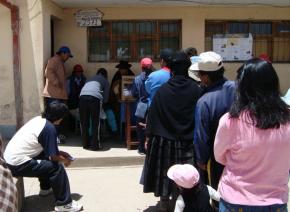Can Bolivia’s constitution stop the right?
assesses the impact of the referendum that ratified Bolivia's new constitution.
MORE THAN 62 percent of Bolivians voted January 25 to ratify a new constitution that promises to re-found the country in the interests of Bolivia's indigenous majority. That evening, President Evo Morales Ayma, an Aymara Indian and the nation's first indigenous president, declared, "The colonial state ends here. Internal colonialism and external colonialism end here. Sisters and brothers, neoliberalism ends here too."
The successful passage of the new constitution marks a victory for Morales, and another setback for Bolivia's right-wing opposition.
The new charter grants the state greater control over the country's natural resources, establishes water as a basic right, and guarantees indigenous and women representation in Congress. In addition to making all of Bolivia's 36 native languages official alongside Spanish, the constitution grants indigenous groups rights to administer their own resources, levy taxes and allocate funds, make their own laws and carry out community justice as long as national laws are not violated.

Bolivia has rewritten its constitution before--this is the country's 17th--but this is the first to be written by an elected constituent assembly and ratified by a popular referendum. As independent La Paz-based journalist Jean Friedman-Rudovsky pointed out in Time, Bolivia's "last constitution was written and enacted by Parliament in 1967 without the participation of a single indigenous person."
Yet the democratic nature of the constitutional process was compromised at various points in the two and a half years since the rewriting process began. The first concession to the right was the government's retreat on its promise to allow the constituent assembly to include representatives from social movements and indigenous communities. Then, Morales' MAS (Movement Toward Socialism) party bowed to conservatives to secure the constitution's passage in Congress this past October.
Morales' biggest retreat was around land. The draft constitution that emerged from the 2006-2007 Constituent Assembly would have required the confiscation and redistribution of any landholdings above 5,000 or 10,000 hectares (about 12,500 or 25,000 acres), to be decided in a parallel referendum. In the version that emerged from Congress, the limit is not retroactive, and therefore only applies to newly acquired land. While the new charter permits the government to seize land deemed unproductive, almost all large landholdings will remain untouched.
This backpedaling on land reform is highly significant in a country where 1 percent of the population owns more than two-thirds of the land. So it comes as no surprise that in a parallel vote, 79 percent of Bolivians chose the stricter maximum of 5,000 hectares, demonstrating the overwhelming support that exists for land redistribution.
The constitution, however, does include other demands from the left. It strengthens women's rights by apportioning them political representation, guaranteeing equal pay for equal work, and prohibiting sex discrimination. But the constitution fails to legalize abortion and also defines marriage as between a man and a woman.
THE CONSTITUTION failed to pass in the four eastern states that are the base of Bolivia's right wing--Santa Cruz, Beni, Pando and Tarija, collectively nicknamed the media luna (half moon) because of their shape.
But the usually bold and violent right remained unusually calm in the run-up to the referendum. This is not because of any change of heart, but rather the divisions within the right's leadership and confusion within its ranks. The opposition lost momentum and legitimacy in the fallout from a wave of violence it orchestrated last September, which culminated in an attack on Morales supporters in the department of Pando that left at least 18 dead.
The killings widened a rift between the media luna opposition forces and the traditional conservative parties based in the capital of La Paz, which have a greater presence in Congress. Moreover, the media luna right has become fractured itself.
This by no means indicates that the MAS has defeated the Bolivian oligarchy and potential coup-makers for good. But the opposition's weakened position, as well as this most recent popular mandate offers Morales an opportunity to make use of his political capital to push forward further reforms.
The ratification of the constitution came five days after the swearing in of Barack Obama as president in the U.S. Relations between the U.S. and Bolivia have improved somewhat since--normal relations had broken down when Philip Goldberg, the U.S. ambassador under Bush, was expelled under suspicion of aiding the media luna opposition. State Department Spokesman Robert Wood congratulated "the Bolivian people" on the referendum and said, "We look forward to working with the Bolivian government in ways we can to further democracy and prosperity in the hemisphere."
But Obama and Secretary of State Hillary Clinton have yet to indicate whether they will reverse former George Bush's ouster of Bolivia from the Andean Trade Promotion and Drug Eradication Act (ATPDEA), which could cost Bolivia as many as 20,000 jobs, according to estimates. Further, U.S. pressure to criminalize coca--traditionally an excuse for U.S. intervention in the Andean region--is unlikely to be resolved any time soon.
The constitution affords Morales the chance to be elected to one more term and moves elections up by a year--which means presidential elections will take place this December. Morales is sure to win, bar any unforeseen changes.
Even so, big questions are hanging over the future of Bolivian politics. Whether Morales will make use of the current calm and his renewed popular mandate to further his reform program remains to be seen. Many on the Bolivian left--in the social movements and the trade unions--remain highly critical of the concessions that Morales made to the right.
Furthering the process of fully dismantling neoliberalism--as well as older structures of political, economic and social equality that have dominated Bolivia for 500 years--will take renewed mobilization from the social movements that brought Morales to power.


